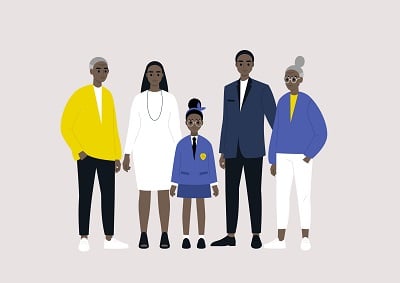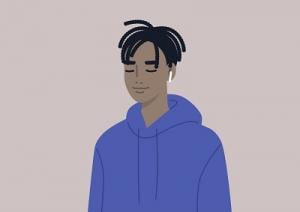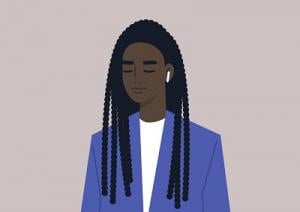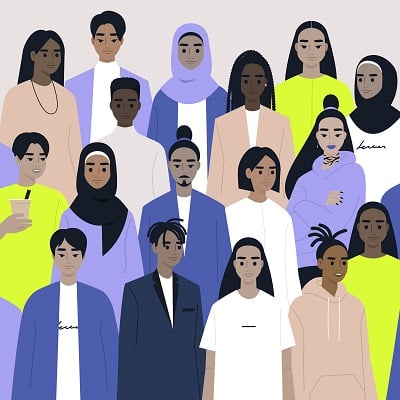For years, mental health education and awareness in Black communities has been fueled by negative stigmas, racial discrimination in mental health care and a lack of equitable access to resources and services. Therefore, ADAA is using Black Mental Health Month to promote the strength and power one feels when leveraging your own community members as a support system. Having the courage to share stories of triumph and/or tribulations can offer a sense of power because one quickly realizes that there are others that share similar experiences. In honor of ADAA’s first annual Black Mental Health Month, we encourage you to share your story and actively listen to the experiences of others to truly find the power of community. Find out how to share your story with ADAA.
- Understanding Mental Health Stigmas
- Depression & Anxiety
- Choosing the Right Therapist
- Sharing Your Personal Story
- Finding Community Support
- ADAA Board of Directors Statement: ADAA Stands Against Racism
- Additional Mental Health Resources
Understanding Mental Health Stigmas
Acknowledging mental health and wellness specifically within African American communities can be a difficult task. In the Black community, people often misunderstand what a mental health condition is and therefore begin to create negative stigmas around the topic. This lack of understanding leads many to believe that a mental health condition is a personal weakness or a form of punishment. Many African Americans have trouble recognizing the signs and symptoms of mental health conditions such as anxiety and depression, which leads to underestimating the effects of mental health conditions. Members of the Black community may also be reluctant to discuss mental health issues and seek treatment because of the shame and stigma still associated with such conditions in their community.1
When black people—especially black women—report health problems, symptoms or medical issues to professionals, their experiences are commonly minimized or ignored. They are commonly told directly or indirectly that they are exaggerating, and they are treated accordingly. When they request or advocate for specific tests or services, they are commonly reminded they are not themselves medical professionals and what they are requesting isn't needed. This itself can increase feelings of anxiety and depression. It is also one more reason that many black people might be reluctant to seek mental health services or trust that health professionals have their best interest in mind.
Historically, health professionals (including POC professionals educated in the west) have been taught and socialized to think/assume that black people (and other people of color) don't experience physical and emotional pain to the same degree as non-POC. And systems have been created to support this view. The pop-culture and feminist lexicon also reinforces this with the "strong black woman" and "strong black man" trope.
It can be hard to unlearn some of the negative stigmas associated with mental health when some of the Black community still reinforce them. However, there have recently been many strides in the community to end the stigmas that have proved successful. It is not an easy change or adjustment, but it begins with unlearning those stigmas and becoming educated on the real definition of those mental health conditions. Ultimately this can help to embrace your own mental health journey.
Depression & Anxiety
Although anyone can develop a mental health problem, Black Americans sometimes experience more severe forms of mental health conditions due to unmet needs and other socio-economic barriers. Nearly 45 million people in the U.S. identify as Black, with at least 3.1 million identifying as a combination of Black and another race. Of that, More than 7 million Black and African American individuals in the U.S. are living with a mental health condition.3 According to the Health and Human Services Office of Minority Health, Black Americans are 20% more likely to experience serious mental health problems than the general population. Black youth who are exposed to violence are at a greater risk for PTSD by over 25%.2 Black Americans are also more likely to be exposed to factors that increase the risk for developing a mental health condition, such as homelessness and exposure to violence.

Both depression and anxiety are often misdiagnosed and mistreated in Black communities. Because Black communities have historically experienced extreme adversities, it is easy for the community to ignore and normalize symptoms of depression and anxiety disorders like post-traumatic stress disorder (PTSD). Therefore, gathering and understanding information on how to recognize the signs and impacts of both depression and anxiety, can make it easier to reclaim one’s own mental health journey.
Choosing the Right Therapist
It is important to find a mental health provider who demonstrates the ability to understand and consider the social and cultural needs of diverse patients. Unfortunately, research has shown a lack of understanding or cultural competence in mental health care, which results in misdiagnosis and inadequate treatment. When meeting with a mental health professional ask questions to get a sense of their level of cultural sensitivity, whether they have treated other African Americans, received training in cultural competence, and how they plan to take beliefs and practices into account when suggesting treatment. Learn more about finding the right therapist.
Below are websites where you can find Black mental health providers in your area.
- African American Mental Health Providers
- Association of Black Therapists
- BIPOC therapists
- Black Emotional and Mental Health Collective
- Black Therapist Listing -DMHUS
- Dr. Erlanger Turner, Clinical Psychologist
- Inclusive Therapists
- Melanin and Mental Health- Therapist
- National Queer and Trans Therapists of Color Network
Finding Community Support
These ADAA resources—blog posts, webinars, articles, and stories—provide helpful information, support, and opportunities to learn more about mental health within Black communities.
Personal Stories from the ADAA Community:
- I Didn't Shower for Weeks, Kellene Diana, 2024
- Finding the Light at the End of the Tunnel, Daneisha Carter, 2023
- Being a Black Woman Hiding From the World, Shanean Henry, 2023
- Your “Strong” Friends Need Checking in on Too: Despair and High Functioning Depression, Tiara Johnson, 2022
- Celebrating Progress: Why the Celebration of Juneteenth Matters to the Black Community, Tiara Johnson, 2022
- 5 Meaningful Ways to Embrace Black Mental Health This Month, Tiara Johnson, 2022
- My Anxiety Triumph, Nikia Jones, 2022
- Realizing My Power, Charmagne, 2021
- Pandemic 2020- A New Onset, Kellene Diana, 2021
- The Pendulum of My Moods, Kayla Barrett, 2021
- Living with 2020 Vision,Tiara Johnson, 2021
- My Experience as a Black Artist with Racial Trauma, Amaranthia Sepia, 2020
- Easy (A)nxiety - Short Film, Briana Stanley, 2019
- Letting the Music Speak, Khing Ceaze, 2019
- Kennedy's Story, Kennedy Campbell, 2019
- I Beat Anxiety and Depression, Kellene Diana, 2019
- A Long Line of Depression and Anxiety: The Stigma Stops Here, Adina Young, 2018
Support from ADAA Professional Members and Media Resources:
ADAA Blogs and Additional Resources
- Mental Health in the Black Community, ADAA video. Dr. Atasha Jordan
- Redefine and Unlearn: BIPOC Youth Destigmatize Mental Health in their Community, ADAA blog, Susan Gurley, ADAA Executive Director
- Mind the Gap: Worsening Black Maternal Mental Health Outcomes During the Pandemic, Lediya Dumessa, PhD, and Johanna Kaplan, PhD
- How Black Women are Harnessing the Power of Racial Identity in the Face of Racism, Ifrah Sheikh, MSc, MA
- Celebrating BIPOC Mental Health Trailblazers, ADAA blog, Susan Gurley, ADAA Executive Director
- Addressing Systemic Racism: A Call to Action for Allies, ADAA webinar by Kimberlye Dean, PhD
- Addressing Systemic Racism in Action: Understanding the Mental Health Professionals’ Tools for Change, ADAA blog for Therapists, Kimberyle Dean, PhD and Luana Marques, PhD
- How Organizations Can Support the Mental Health of Black Employees, HBR.org, Article by Angela Neal-Barnett, PhD
- Jump in with Jumi! Anxiety and Depression, Jump in with Jumi Podcast, Angela Neal-Barnett, PhD
- Persistent Trauma of Systemic Racial Inequities and the Perils of COVID-19, blog by Mbemba Jabbi, PhD and Kathariya Mokrue, PhD
- Protests, Racism and Our Children: Helping Kids Cope, ADAA blog for parents, Michelle Witkin, PhD
- Protests, Racism and Our Children: Helping Kids Cope, ADAA infographic by Michelle Witkin, PhD
- Translating cultural assets research into action to mitigate adverse childhood experience–related health disparities among African American youth, American Psychological Association, Briana Woods-Jaeger, PhD
- What Now? Dealing with the Emotional Aftermath of the Verdict, ADAA blog by Kathariya Mokrue, PhD
- African Americans With Anxiety: How to Overcome Unique Obstacles, ADAA blog, Angela Neal-Barnett, PhD
- The Effects of Racism on Mental Health: How to Cope, ADAA webinar Karen G. Martínez, MD, MSc and Jessica Graham-LoPresti, PhD
- To Be Female, Anxious and Black, ADAA blog, Angela Neal-Barnett, PhD
ADAA Infographics
- BIPOC Communities: Questions to Ask When Selecting a Therapist
- Recognizing Anxiety and Depression in the Black Community
- Ways to Embrace Black Mental Health
Trending Articles
- Black men in sports are speaking out about their mental health, The Undefeated, 2022
- How some therapists are helping patients heal by tackling structural racism, NPR, 2022
- Black and Brown Americans had higher rates of anxiety and depression during the Covid-19 pandemic, new study finds, CNBC 2022
- Erasing Mental Health Stigma in the Black Community, National Alliance on Mental Illness, 2022
- Black therapists are struggling to be seen on TikTok. They're forming their own communities instead, CNN, 2022
- Addressing the Lack of Diversity in the Mental Health Field, National Alliance on Mental Illness, 2022
- America's racial reckoning is putting a spotlight on Black mental health, NBCnews.com, 2022
- Black Pioneers in Mental Health, Mental Health America, 2022
- 4 Female Psychologists Create Mental Health Company for Black Community: 'Break Down Stigma', People, 2021
- Biden Wants to Fix Racial Inequality. Mental Health Access Is an Important Place to Start, NBCnews.com, 2021
- Black athletes speaking out can light a path to mental health, Sportico, 2022
- Black Masculinity and Mental Health, Everyday Health, 2021
- Black men mental health matters, American Psychology Association, 2021
- Black Women’s Mental Health Is Often Invalidated — & That Problem Starts At Home, Refinery29, 2021
- Confronting Barriers And Systemic Racism To Address Mental Health Among Black Youth, Mental Health America, 2021
- How can we break mental health barriers in communities of color, McLean Hospital, 2022
- How To Find A Therapist Who Focuses On Black Mental Health, Huffington Post, 2021
- Its Hard to Search for a Therapist of Color: These Website Want to Change That, NYTimes.com, July 2021
- The current pollical moment’s impact on Black mental health, Psychology Today, 2022
- Young Black Athletes Are Launching a Mental Health Revolution, BNC.tv, 2021
- Why Do Black Men Hide Mental Illness, Health Central, 2022
ADAA Board of Directors Statement: ADAA Stands Against Racism
June 4, 2020
The Anxiety and Depression Association of America’s (ADAA) mission is more critical than ever. Since ADAA’s founding 40 years ago, we have been committed to ensuring that everyone who struggles with an anxiety disorder, depression or PTSD can obtain the resources they need to live healthier and more productive lives.
Over the last few months, we have seen that many of our underserved neighborhoods and communities of color have suffered disproportionately from the spread of COVID-19 and racism. Many of these same marginalized communities are also grappling with economic uncertainty, and now with the recent killing of George Floyd following so many other killings of African Americans, with increased mental health issues. ADAA’s mental health experts understand that exposure to these pervasive racial traumas and stressors are detrimental to one’s mental health. We also know that many people of color who suffer from mental health issues also experience less access to care and services. Read the full statement here.
Additional Mental Health Resources
- Aakoma Project
- Ash Inspires
- African American Wellness Project
- BLKHLTH
- Black Girl In Om
- Black Girls Smile
- Black Men Heal
- Black Mamas Matter Alliance
- Black Emotional and Mental Health (BEAM) Collective
- Black Mental Health Alliance
- Black Mental Wellness
- Mental Health Coalition: Black Mental Health Resources
- Boris L Henson Foundation
- Check Your Privilege
- Decolonizing Psychology
- DiveInWell
- Ethel's Club
- Eustress
- GirlTrek
- Healing Black Women
- Healing While Black
- JED Foundation - Love is Louder Project
- Mental Health America- Black Communities
- Melanin and Mental Health- Resources
- Mental Health Coalition BIPOC Resources
- Mental Health Resources for African Americans - NAMI.org
- National Black Justice Coalition
- The Movement for Black Lives
- Ourselves Black
- PsychHub List of Resources
- QTPoC Mental Health
- Sista Afya
- The Confess Project
- The Loveland Foundation
- The Steve Fund
- The Safe Place App is a Minority Mental Health app that educates and raises more awareness on Mental Illness in the Black Community
- Therapy for Black Girls
References:
- National Alliance on Mental Illness (NAMI). (2021). Black/African American. NAMI.org. https://www.nami.org/Your-Journey/Identity-and-Cultural-Dimensions/Black-African-American.
- American Psychological Association (APA). (2017, September). African Americans Have Limited Access to Mental and Behavioral Health Care. APA.org. https://www.apa.org/advocacy/civil-rights/diversity/african-american-health.
- file:///Users/tiaraj./Desktop/2022-BIPOC-MHM-Toolkit.pdf















